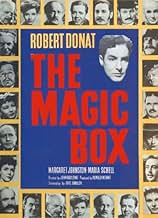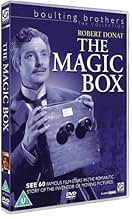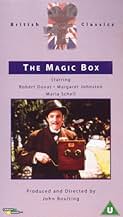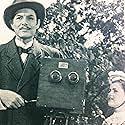IMDb RATING
7.0/10
1.5K
YOUR RATING
A chronicle of the life of William Friese-Greene, a British inventor and early pioneer in cinema.A chronicle of the life of William Friese-Greene, a British inventor and early pioneer in cinema.A chronicle of the life of William Friese-Greene, a British inventor and early pioneer in cinema.
- Nominated for 2 BAFTA Awards
- 1 win & 2 nominations total
Renée Asherson
- Miss Tagg
- (as Renee Asherson)
- Director
- Writers
- All cast & crew
- Production, box office & more at IMDbPro
Featured reviews
I'm sure it didn't hurt in the resolve of the British film industry to honor one of its pioneers and one who some claim to have been the actual inventor of motion pictures, William Friese-Greene, to have one of his grandchildren, Richard Greene as a film star in his own right. The Magic Box is a fine tribute to someone generally forgotten if known at all to American audiences especially.
Robert Donat brings his Mr. Chips character and weaves it into the character of William Friese-Greene. The story is told in flashback and in reverse order, first by his second wife Margaret Johnston from their first meeting in 1897 through their marriages and then later by Donat himself as he remembers his first wife Maria Schell. But in both remembrances, the thing that stands out is his driving obsession to capture movement on some medium. As Donat eloquently puts it, 'movement is life'.
It costs him dear, he does not get the credit he feels due him, it goes to that upstart Thomas Edison from the USA. Actually fellow Britishers George Alfred Smith and Charles Urban and Frenchmen Auguste and Louis Lumiere and Emile Reynaud all could claim pioneering contributions to the motion picture as well. Friese-Greene was a fine portrait photographer, but spent all his money on his experiments, even selling the patent he took out on his early motion picture camera.
Donat, Johnston and Schell are supported by a massive cast of the best British players doing small parts in tribute and belated recognition to the guy who now is considered if not THE inventor of motion pictures, the founder of British cinema. From Laurence Olivier in the role of an astonished policeman who is the first to see Robert Donat's breakthrough, to Bernard Miles as Donat's stuffy cousin who's worried about having the bite put on him, to young John Howard Davies as the youngest of Friese-Greene's sons, you'll recognize lots of familiar faces.
Still the film belongs to Donat as the obsessed, but touching Friese- Greene who helped give the world a universal medium of entertainment. Donat never gave a bad performance on the screen and Friese-Greene ranks among his best.
Robert Donat brings his Mr. Chips character and weaves it into the character of William Friese-Greene. The story is told in flashback and in reverse order, first by his second wife Margaret Johnston from their first meeting in 1897 through their marriages and then later by Donat himself as he remembers his first wife Maria Schell. But in both remembrances, the thing that stands out is his driving obsession to capture movement on some medium. As Donat eloquently puts it, 'movement is life'.
It costs him dear, he does not get the credit he feels due him, it goes to that upstart Thomas Edison from the USA. Actually fellow Britishers George Alfred Smith and Charles Urban and Frenchmen Auguste and Louis Lumiere and Emile Reynaud all could claim pioneering contributions to the motion picture as well. Friese-Greene was a fine portrait photographer, but spent all his money on his experiments, even selling the patent he took out on his early motion picture camera.
Donat, Johnston and Schell are supported by a massive cast of the best British players doing small parts in tribute and belated recognition to the guy who now is considered if not THE inventor of motion pictures, the founder of British cinema. From Laurence Olivier in the role of an astonished policeman who is the first to see Robert Donat's breakthrough, to Bernard Miles as Donat's stuffy cousin who's worried about having the bite put on him, to young John Howard Davies as the youngest of Friese-Greene's sons, you'll recognize lots of familiar faces.
Still the film belongs to Donat as the obsessed, but touching Friese- Greene who helped give the world a universal medium of entertainment. Donat never gave a bad performance on the screen and Friese-Greene ranks among his best.
Much has been said in other reviews about the subject of John Boulting's biopic, the inventor William Friese-Greene, who spent his life trying to create the eponymous "magic box" that would show moving pictures. Whether he was the first to do so is largely insignificant: the fact that he went largely unrecognized assumes far greater importance.
Planned to celebrate the Festival of Britain in 1951, THE MAGIC BOX recognizes the achievements of someone who spent just about everything - time, money and effort - on his work. Director Boulting alternates between scenes in Friese Greene's (Robert Donat's) laboratory, with domestic sequences involving his wives Edith (Margaret Johnston) and Helena (Maria Schell). Although a devoted husband, Friese-Greene is so obsessed with his work that he neglects his family; as shown in several sequences where he begins to talk excitedly about his discoveries, while remaining oblivious to his wives' complaints. In one sequence, for example, Edith has to remind him that he has missed an important concert at which he was supposed to be the soloist; to avoid any embarrassment with the conductor (Muir Matheson), she had to fill in for him. Sometimes his wives sacrifice their own health to support him; Helena is shown in close-up crumpling a medicinal prescription in her hand as she travels home by coach. In her view it's far more important to encourage Friese-Greene's work than to cure her congenital heart condition.
Boulting adopts an equivocal view of Friese-Greene's work; although obviously an innovator, his obsessions caused pain and suffering in his family, and led to the break-up of profitable partnerships such as that with rich northern business person Arthur Collings (Eric Portman), which could have secured Friese-Greene's financial future.
The film is structured in double flashback, showing us how Friese- Greene's life, and enabling Donat to give a virtuoso performance in the title role. This most underrated of British actors was particularly good at portraying tortured souls (remember GOODBYE MR. CHIPS (1939)), and he manages to communicate the pain lurking at the heart of Friese-Greene's soul, once he realizes the damage he has done to his family. Boulting is fond of using the quick close-up to register his emotions.
As well as being a celebration of the inventor, THE MAGIC BOX celebrates the British film industry by offering roles to virtually all the major stars (and supporting actors) working in the studios at that time. The film offers fans the pleasure of identifying people in the smallest roles, and enjoying scene-stealing cameos such as Margaret Ruthferford's irascible dowager telling Friese- Greene's first employer Guttenberg (Frederick Valk) off; Joyce Grenfell at her toothiest as a member of Edith's choral society; Sidney James and William Hartnell as a pair of World War One army personnel; and Laurence Olivier in his famous cameo as a London police officer marveling at Friese-Greene's invention.
Thematically speaking, Eric Ambler's script might be a familiar one, but that does not prevent viewers from enjoying the film as a celebration of a long-forgotten figure as well as British films as a whole.
Planned to celebrate the Festival of Britain in 1951, THE MAGIC BOX recognizes the achievements of someone who spent just about everything - time, money and effort - on his work. Director Boulting alternates between scenes in Friese Greene's (Robert Donat's) laboratory, with domestic sequences involving his wives Edith (Margaret Johnston) and Helena (Maria Schell). Although a devoted husband, Friese-Greene is so obsessed with his work that he neglects his family; as shown in several sequences where he begins to talk excitedly about his discoveries, while remaining oblivious to his wives' complaints. In one sequence, for example, Edith has to remind him that he has missed an important concert at which he was supposed to be the soloist; to avoid any embarrassment with the conductor (Muir Matheson), she had to fill in for him. Sometimes his wives sacrifice their own health to support him; Helena is shown in close-up crumpling a medicinal prescription in her hand as she travels home by coach. In her view it's far more important to encourage Friese-Greene's work than to cure her congenital heart condition.
Boulting adopts an equivocal view of Friese-Greene's work; although obviously an innovator, his obsessions caused pain and suffering in his family, and led to the break-up of profitable partnerships such as that with rich northern business person Arthur Collings (Eric Portman), which could have secured Friese-Greene's financial future.
The film is structured in double flashback, showing us how Friese- Greene's life, and enabling Donat to give a virtuoso performance in the title role. This most underrated of British actors was particularly good at portraying tortured souls (remember GOODBYE MR. CHIPS (1939)), and he manages to communicate the pain lurking at the heart of Friese-Greene's soul, once he realizes the damage he has done to his family. Boulting is fond of using the quick close-up to register his emotions.
As well as being a celebration of the inventor, THE MAGIC BOX celebrates the British film industry by offering roles to virtually all the major stars (and supporting actors) working in the studios at that time. The film offers fans the pleasure of identifying people in the smallest roles, and enjoying scene-stealing cameos such as Margaret Ruthferford's irascible dowager telling Friese- Greene's first employer Guttenberg (Frederick Valk) off; Joyce Grenfell at her toothiest as a member of Edith's choral society; Sidney James and William Hartnell as a pair of World War One army personnel; and Laurence Olivier in his famous cameo as a London police officer marveling at Friese-Greene's invention.
Thematically speaking, Eric Ambler's script might be a familiar one, but that does not prevent viewers from enjoying the film as a celebration of a long-forgotten figure as well as British films as a whole.
Whether or not William Friese-Greene was actually the father of motion pictures he was certainly in there trying. And though Edison and some French guys get a mention in passing this beautifully-mounted star-laden tribute to dogged endeavour is all Willie's show - made thirty years after his death and timed for the Festival of Britain. It almost missed the bus in this regard and wasn't generally released until the following year,something charmingly British about that. The film itself is charmingly British too, handling its huge cast and period detail with steady quietly-absorbing assurance. Eric Ambler's deftly-crafted script provides romance, comedy, poignancy and an absolutely splendid pinnacle-scene which sums the picture up both in terms of story and production-plan. His dual-flashback structure, which some find confusing, permits the masterly Robert Donat to re-wind from forgotten old codger to eager young whippersnapper and back again with a shift in the middle for 'changing reels' on the assertion of his second wife that "Willie was before my time". This second marriage assuaged his widower-loneliness and certainly produced quite a brood but was blighted by despondency - he's not mentioned in the Encyclopedia - and his ever-present financial incompetence which severs their union. It's the more distant past, the era of inspiration and achievement, which is the film's ultimate destination.
The cameo stars fall to with aplomb - 'The Play's the Thing, what would you like us to do ?' There's the fun of the Living Statues, Margaret Rutherford at her most formidable, wiping the floor with Mr. Guttenberg, Joan Hickson's cute scene-stealing as the customer with the facial twitch, Muir Mathieson appearing on-screen for once conducting the Bath Choral Society while the only solo male vocalist is miles away chinwagging forgetfully with the inventor of photography. Eric Portman bulldozes through as Willie's irascible business-partner and almost every trade and profession is represented along the way by a famous face - doctors, reporters, bank managers, estate agents, instrument-makers, pawnbrokers and company promoters - this last attributed in the credits to Roland Culver and Garry Marsh who do not appear in the release-prints. The BFI site solves the vexing question of the truncated version short by fifteen minutes which is now apparently the only one that survives. The most illustrious guest is fittingly the last to make an entrance - Olivier as the apprehensive bobby on the beat dragged in off the street by Willie to watch Hyde Park shimmering on a sheet. One of the great scenes in British cinema its magical blend of narrative-significance and emotional realism is in effect the movie's climax. The quibbling over technical inaccuracies here is irrelevant, it's not a documentary and as long as the audience gets the point the purpose is served. Maria Schell is enchanting as the first Mrs. Willie and Jack Cardiff - the Technicolor Kid - would have made our hero proud. It's the visionary labour of Willie and his contemporaries which has given us what we love. To correct another poster the last ironic line in the film after Willie's demise is spoken not by Dennis Price but by Michael Denison.
The cameo stars fall to with aplomb - 'The Play's the Thing, what would you like us to do ?' There's the fun of the Living Statues, Margaret Rutherford at her most formidable, wiping the floor with Mr. Guttenberg, Joan Hickson's cute scene-stealing as the customer with the facial twitch, Muir Mathieson appearing on-screen for once conducting the Bath Choral Society while the only solo male vocalist is miles away chinwagging forgetfully with the inventor of photography. Eric Portman bulldozes through as Willie's irascible business-partner and almost every trade and profession is represented along the way by a famous face - doctors, reporters, bank managers, estate agents, instrument-makers, pawnbrokers and company promoters - this last attributed in the credits to Roland Culver and Garry Marsh who do not appear in the release-prints. The BFI site solves the vexing question of the truncated version short by fifteen minutes which is now apparently the only one that survives. The most illustrious guest is fittingly the last to make an entrance - Olivier as the apprehensive bobby on the beat dragged in off the street by Willie to watch Hyde Park shimmering on a sheet. One of the great scenes in British cinema its magical blend of narrative-significance and emotional realism is in effect the movie's climax. The quibbling over technical inaccuracies here is irrelevant, it's not a documentary and as long as the audience gets the point the purpose is served. Maria Schell is enchanting as the first Mrs. Willie and Jack Cardiff - the Technicolor Kid - would have made our hero proud. It's the visionary labour of Willie and his contemporaries which has given us what we love. To correct another poster the last ironic line in the film after Willie's demise is spoken not by Dennis Price but by Michael Denison.
A first-class actor ,playing a character from his youth to an old man,with the same talent:he is as convincing as the mischievous boy who takes photographs unbeknown to his boss as the old man who tries to save the seventh art from the moneychangers in the Temple . The film has an unusually inventive construction:it is roughly made of two flashbacks ,but the first one takes place after the second one."The magic box" tells the story of a pioneer of the cinema who died in dire straits ("that's the price for a seat for pictures" )His destiny resembles that of Georges Méliès who ended his life selling candies in a railway station and who never complained about his fate.Geniuses often die unnoticed.The cinematography is splendid with tasteful colors ,the dialog does not forget humor (Donat:"Enjoy yourselves!Schell:"We're going to the church!!"),and there are very powerful scenes:the concert where Schell sings a moving solo "Where is he?I know not!I know not!";an ecstatic Donat showing his film to a constable .The cast is incredibly various and includes such luminaries as Laurence Olivier,Margaret Rutherford,Peter Ustinov,Stanley Holloway and more ,all in supporting parts or even often cameos.
How prophetic the pioneer's last words were!
How prophetic the pioneer's last words were!
A stunning biography of William Friese-Greene, the UK inventor who made important contributions towards the creation of the motion picture, then saw greatness pass him by. Brilliantly written by Eric Ambler, and with beautiful color photog by Jack Cardiff (working in the 3-strip Technicolor process that we see Friese-Greene working towards in the picture!). Robert Donat's performance in the lead is among his best screen work. As this was made on the occasion of Britain's 1951 "Festival of Lights", virtually every British actor of note at the time appears in the picture---but pay particularl attention for Laurence Olivier, as a London "bobby" who is the first to see Friese-Greene's "pictures that move", and for the film's closing line, delivered by Dennis Price.
Did you know
- TriviaOne of the extras in this movie is a teenage Ronald Kray (later the infamous London gangster).
- GoofsIn 1915 when Green's three eldest sons join the army, the landlord's agent mentions that the Spanish influenza is going around. In actuality the Spanish influenza did not begin until 1918.
- Quotes
William Fox-Talbot: The original thinker - the innovator - mustn't mind seeming a little foolish to his contemporaries. He must always look to his star... In the end, he may still fail. That's unimportant. If he is true to himself, he won't be too unhappy or embittered, even in failure, and will still speak for what is good.
- Crazy creditsClosing credits superimposed over the tablet bearing the following: WILLIAM FRIESE-GREENE 1855 - 1921 A PIONEER OF THE CINEMA
- ConnectionsEdited into Kraft Television Theatre: The Magic Box (1956)
- How long is The Magic Box?Powered by Alexa
Details
- Runtime1 hour 58 minutes
- Aspect ratio
- 1.37 : 1
Contribute to this page
Suggest an edit or add missing content



































